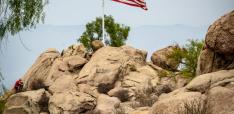‘Waiting for Godot?: The Theatre of the G20’
This post represents the second in a series from the ongoing G20 summit being covered on the ground by the Global Leadership Initiative's team. Please check in regularly to keep up to date with the latest news and analysis from the summit.
Media Centre – G20 Summit. Hosting the G20 has always been an opportunity to showcase one’s country and to impress upon the world that they belong among the great powers. In many ways part of that message is not only to pick a national site of beauty, but to also stage a grand event. As a result, the G20 becomes a piece of theatre, in which a great state ‘acts like how a great state should act.’ This performance is not only for world leaders, but also for the media, who are meant to broadcast it to the world.
Yet, like all theatre the audience expects the performance to deliver on theatric foundations.
First, the G20 performance must be played out in one of the country’s most scenic locations in order to provide the backdrop for the Summit’s final ovation the ‘Family Photo’. For this G20 the government of Turkey has selected the ‘Turkish Riviera’ of Antalya.
Second, the anticipation around the G20 performance should be built up so that the audience knows that it is witnessing a world premier. Like many G20’s before, the Turkish government promised an ambitious agenda that included the crisis in Syria, the global economy, inclusive growth, sustainable development, employment, terrorism, energy, financial regulation, IMF reform, the refugee crisis, corruption, trade and international tax.
Third, the performance needs to have a great show of security, where those who would wish to heckle the performers get no chance. This is Shakespeare, not pantomime, and outside participation is not welcome or needed.
Fourth, each actor needs to play their part and to convince a potentially skeptical audience that they mean business and can deliver the performance that the world audience increasingly demands. In delivering the opening monologue, Recep Tayyip Erdogan must remind the audience why they should pay close attention to this G20 and how it promises to be a performance to remember.
Lastly, the G20 should crescendo into a strong communiqué that will hopefully bring the audience to its feet. This is the test of a great G20 performance and can catapult its leading actor into the global limelight.
However, there are worrying signs that this G20 performance will be more like Waiting for Godot than the rallying cry from Henry V. Like Vladimir and Estragon, the audience remains waiting for the arrival of our metaphorical Godot, who is both omnipresent and yet conspicuously, and traditionally, absent in delivery.
First, although the Summit is positioned next to one of Turkey’s most beautiful resort locations, it remains out of view, with the press locked into a small sector without the ability to move beyond the tightly controlled media centre. To leave the press centre risks being unable to get back, since the organizers failed to properly think through their transportation logistics leaving the press often stranded in the last place they managed get to or having to offer bribes to security agents to arrange transportation. As a result, beyond the opulence of the press hotel, there is not much to showcase to the world. For the moment, the world sees the same tired and orchestrated progressions of diplomatic stagecraft and not the kind of improvisation that often denotes the great summitry performances in history.
Second, although Erdogan promised a grand performance, even its build-up showed signs of performance anxiety. Given the proximity of the Turkish election, and the implications to power involved, the G20 took a backseat and the work was left to a series of associated G-Summits, such as the W20, C20 and T20. Yet, like most G20 performances, the final role these support actors play remains to be seen and the history of upstaging the main G20 actor is not promising.
Third, although the performance has its fair share of security to rightly ward off hecklers (12,000 military personnel), it has dampened the audience experience. One notable lack in performance relates to the strangely absent Turkish media (see our next blog), which has seemingly been kept away from the box office doors. This will no doubt help spoil the reviews of this G20 and will keep any possible ‘show stoppers’ that may occur out of domestic view.
Fourth, other than the Paris attacks that cannot be ignored, the monologue that set the tone for today’s G20 remained flat. Even with Syria and the refugee crisis waiting at the stage door, the usual suspects have so far only played their roles with the same lackluster rhetoric that has dogged past performances. At the moment, what this suggests for the audience is that there could still be a promising performance, but leaves us worried that in the face of mounting global collective action problems, and the need for global leadership, the audience will most likely still be waiting for their G20 Godot.
The G20 Team: Garrett Wallace Brown, Laura Copete, Amna Kaleem, Joanna Moody, Polly Sculpher, Gregory Stiles, Olivia Wills and Megan Wilson. Global Leadership Initiative, University of Sheffield. For the team's earlier posts please see here.


